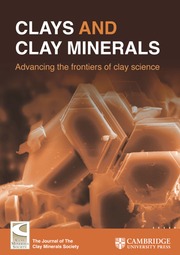Crossref Citations
This article has been cited by the following publications. This list is generated based on data provided by
Crossref.
Pernes‐Debuyser, A.
and
Tessier, D.
2004.
Soil physical properties affected by long‐term fertilization.
European Journal of Soil Science,
Vol. 55,
Issue. 3,
p.
505.
Bortoluzzi, Edson Campanhola
Santos, Danilo Rheinheimer dos
Kaminski, João
Gatiboni, Luciano Colpo
and
Tessier, Daniel
2005.
Alterações na mineralogia de um argissolo do Rio Grande do Sul submetido à fertilização potássica.
Revista Brasileira de Ciência do Solo,
Vol. 29,
Issue. 3,
p.
327.
Bortoluzzi, Edson Campanhola
Pernes, Miguel
and
Tessier, Daniel
2007.
Interestratificado caulinita-esmectita em um argissolo desenvolvido a partir de rocha sedimentar do Sul do Brasil.
Revista Brasileira de Ciência do Solo,
Vol. 31,
Issue. 6,
p.
1291.
Barré, P.
Velde, B.
and
Abbadie, L.
2007.
Dynamic role of “illite-like” clay minerals in temperate soils: facts and hypotheses.
Biogeochemistry,
Vol. 82,
Issue. 1,
p.
77.
Jouquet, Pascal
Bottinelli, Nicolas
Lata, Jean-Christophe
Mora, Philippe
and
Caquineau, Sandrine
2007.
Role of the fungus-growing termite Pseudacanthotermes spiniger (Isoptera, Macrotermitinae) in the dynamic of clay and soil organic matter content. An experimental analysis.
Geoderma,
Vol. 139,
Issue. 1-2,
p.
127.
Dère, C.
Lamy, I.
Jaulin, A.
and
Cornu, S.
2007.
Long-term fate of exogenous metals in a sandy Luvisol subjected to intensive irrigation with raw wastewater.
Environmental Pollution,
Vol. 145,
Issue. 1,
p.
31.
Liu, Yan-li
Zhang, Bin
Li, Cheng-liang
Hu, Feng
and
Velde, Bruce
2008.
Long‐Term Fertilization Influences on Clay Mineral Composition and Ammonium Adsorption in a Rice Paddy Soil.
Soil Science Society of America Journal,
Vol. 72,
Issue. 6,
p.
1580.
Turpault, M.-P.
Righi, D.
and
Utérano, C.
2008.
Clay minerals: Precise markers of the spatial and temporal variability of the biogeochemical soil environment.
Geoderma,
Vol. 147,
Issue. 3-4,
p.
108.
Barré, Pierre
Velde, Bruce
Fontaine, Colin
Catel, Nicole
and
Abbadie, Luc
2008.
Which 2:1 clay minerals are involved in the soil potassium reservoir? Insights from potassium addition or removal experiments on three temperate grassland soil clay assemblages.
Geoderma,
Vol. 146,
Issue. 1-2,
p.
216.
Bortoluzzi, E. C.
Velde, B.
Pernes, M.
Dur, J. C.
and
Tessier, D.
2008.
Vermiculite, with hydroxy-aluminium interlayer, and kaolinite formation in a subtropical sandy soil from south Brazil.
Clay Minerals,
Vol. 43,
Issue. 2,
p.
185.
Tye, A.M.
Kemp, S.J.
and
Poulton, P.R.
2009.
Responses of soil clay mineralogy in the Rothamsted Classical Experiments in relation to management practice and changing land use.
Geoderma,
Vol. 153,
Issue. 1-2,
p.
136.
Monna, F.
van Oort, F.
Hubert, P.
Dominik, J.
Bolte, J.
Loizeau, J.-L.
Labanowski, J.
Lamri, J.
Petit, C.
Le Roux, G.
and
Chateau, C.
2009.
Modeling of 137Cs migration in soils using an 80-year soil archive: role of fertilizers and agricultural amendments.
Journal of Environmental Radioactivity,
Vol. 100,
Issue. 1,
p.
9.
Velde, Bruce
and
Barré, Pierre
2009.
Soils, Plants and Clay Minerals.
p.
255.
Hubert, F.
Caner, L.
Meunier, A.
and
Lanson, B.
2009.
Advances in characterization of soil clay mineralogy using X‐ray diffraction: from decomposition to profile fitting.
European Journal of Soil Science,
Vol. 60,
Issue. 6,
p.
1093.
Cornu, Sophie
Montagne, David
Hubert, Fabien
Barré, Pierre
and
Caner, Laurent
2012.
Evidence of short-term clay evolution in soils under human impact.
Comptes Rendus. Géoscience,
Vol. 344,
Issue. 11-12,
p.
747.
Britzke, Darines
da Silva, Leandro Souza
Moterle, Diovane Freire
dos Santos Rheinheimer, Danilo
and
Bortoluzzi, Edson Campanhola
2012.
A study of potassium dynamics and mineralogy in soils from subtropical Brazilian lowlands.
Journal of Soils and Sediments,
Vol. 12,
Issue. 2,
p.
185.
Rosolem, Ciro Antonio
Vicentini, João Paulo Testa Moura Montans
and
Steiner, Fábio
2012.
Suprimento de potássio em função da adubação potássica residual em um Latossolo Vermelho do Cerrado.
Revista Brasileira de Ciência do Solo,
Vol. 36,
Issue. 5,
p.
1507.
Céspedes-Payret, Carlos
Piñeiro, Gustavo
Gutiérrez, Ofelia
and
Panario, Daniel
2012.
Land use change in a temperate grassland soil: Afforestation effects on chemical properties and their ecological and mineralogical implications.
Science of The Total Environment,
Vol. 438,
Issue. ,
p.
549.
Bortoluzzi, Edson Campanhola
Moterle, Diovane Freire
dos Santos Rheinheimer, Danilo
Casali, Carlos Alberto
Melo, George W.
and
Brunetto, Gustavo
2012.
Mineralogical changes caused by grape production in a regosol from subtropical Brazilian climate.
Journal of Soils and Sediments,
Vol. 12,
Issue. 6,
p.
854.
LIAO, Yu-lin
ZHENG, Sheng-xian
NIE, Jun
XIE, Jian
LU, Yan-hong
and
QIN, Xiao-bo
2013.
Long-Term Effect of Fertilizer and Rice Straw on Mineral Composition and Potassium Adsorption in a Reddish Paddy Soil.
Journal of Integrative Agriculture,
Vol. 12,
Issue. 4,
p.
694.


